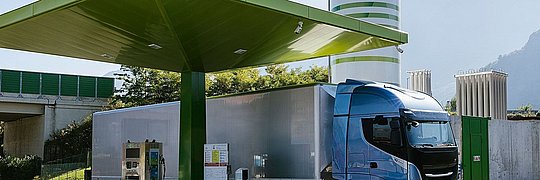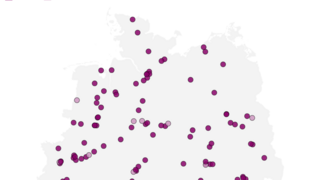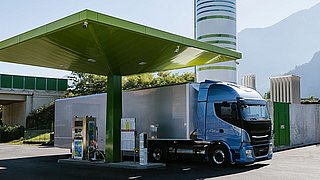
The LNG Task Force and the Natural Gas-based Mobility initiative
dena coordinates and moderates the Natural Gas-based Mobility initiative and LNG Task Force as the central point of contact. In this manner, it supports the German government’s goal of increasing the share of natural gas in the fuel mix to four per cent.

dena coordinates and moderates the Natural Gas-based Mobility initiative and LNG Task Force as a central, cross-sector contact for natural gas and renewable methane as a fuel in Germany, thereby supporting the German government’s goal of increasing the share of natural gas in the fuel mix to four per cent and achieving the climate targets for transport by 2030. dena founded the LNG Task Force together with Deutsche Vereinigung des Gas- und Wasserfaches e.V. (a German technical and scientific association for gas and water) and Zukunft Gas (a lobby organisation for the German gas industry) in 2015.
The LNG task force is a dena project that was completed in 2021. The map shown here was updated in March 2025 as part of the active project “Platform for Sustainable Heavy Goods Transport”. You can find more information on the PNS here (in german).
The challenge:
Greenhouse gas emissions from road freight transport have risen by over 40 per cent compared to 1990. Therefore, alternative drive systems and fuels with lower emissions must be introduced to the market in order to achieve the German government’s climate targets. Vehicles using CNG (compressed natural gas) and LNG (liquefied natural gas) as fuel are based on a technology that is ready for series production and offers a high potential for reducing emissions that harm the environment and affect the climate. In future, however, biomethane and methane produced from renewable electricity (power fuels/PtX) will gain in importance in order to further increase the climate benefits.
However, the developing market still faces big challenges:
- Developing an LNG fuelling station infrastructure network
- Informing consumers of the benefits of liquefied natural gas as a fuel
- Defining political framework conditions to promote the value of the environmental and climate benefits of CNG and LNG in transport
- Incentive systems for the production and use of biomethane
What we are doing:
dena is coordinating and moderating the Natural Gas-based Mobility initiative/LNG Task Force with the aim of establishing CNG, LNG (liquefied natural gas), biomethane and synthetic methane (power fuels) as alternative fuels in road freight transport. The initiative brings together well-known companies from the energy and transport industries across the entire value chain, in addition to customer organisations. The initiative has also become the central point of contact for policymakers’ questions relating to natural gas-based mobility in Germany. The LNG Task Force, together with its partners, submitted a catalogue of recommendations to the Federal Ministry of Transport in September 2018 to accelerate the market development of LNG in road freight transport. The most important measures are:
- Differentiation in the long-term energy taxation according to GHG emissions
- Toll exemption for lorries with CNG, LNG and alternative drive systems until the introduction of a GHG component
- Subsidy of a minimum of 1,000 CNG- and LNG-powered lorries to generate economies of scale and increase cost-cutting potential
- Definition of a target agreed between the company and politicians of 2,500 LNG-powered lorries and 50 LNG refuelling points in the German market by 2020 and 25,000 LNG-powered lorries and 200 LNG refuelling points by 2025.
The overall outcome
The German government has implemented effective measures for consumer-orientated subsidies, which have been well-received by the market to date, in line with the political recommendations of the LNG Task Force. As a result, an initial network of refuelling points is now being established: over 50 LNG refuelling points are planned in Germany by the end of 2020.
However, further measures are needed to continue the positive trend. Users and market players need more planning security for further investments. To this end, the LNG Task Force consolidates the positions of the companies and industries involved, produces information, and develops recommendations for policy action.
- Factsheet BioLNG 1.81 MB pdf
- Genehmigungen von LNG Tankstellen 1.72 MB pdf
- Antworten auf häufig gestellte Fragen - Unfallhilfe & Bergen bei LNG-Fahrzeugen 899.17 KB pdf
- dena-Positionspapier: Zur Fortsetzung der Mautbefreiung für mit Erdgas und Biomethan betriebene Lkw 481.92 KB pdf
- LNG-Taskforce: DVGW Methanemissionen bei der Nutzung von LNG als Kraftstoff für Lkw 757.07 KB pdf
- LNG-Taskforce: Zukunft LNG 4.30 MB pdf
- LNG-Taskforce: Genehmigungsleitfaden für LNG/LCNG-Tankstellen 1.26 MB pdf
- LNG-Taskforce: LNG kann Grün! 8.12 MB pdf
- Diapositiva 1 Europäisches LNG- & CNG-Netzwerk (Marc Liegl, Key Account Manager LNG) 1.27 MB pdf
- Présentation PowerPoint Alternative Antriebsstrategien (Mario Männlein, Product Expert Natural Power Vehicles) 2.72 MB pdf
- Uniper Presentation LNG-Bereitstellung und Infrastruktur (Karl Grobbel, Senior Project Manager) 1.34 MB pdf
- (Microsoft PowerPoint - Shell Kurzvortrag_LNG als Teil der Mobilit\344t in Europa.pptx) Emissionen im Schwerlastverkehr wirtschaftlich senken (Jens Müller-Belau, Energy Transistion Manager Germany) 3.22 MB pdf
- PowerPoint-Präsentation Die letzte Meile zu einer emissionsarmen Transportwelt (Wolfgang Normann, Gesellschafter) 1.64 MB pdf

